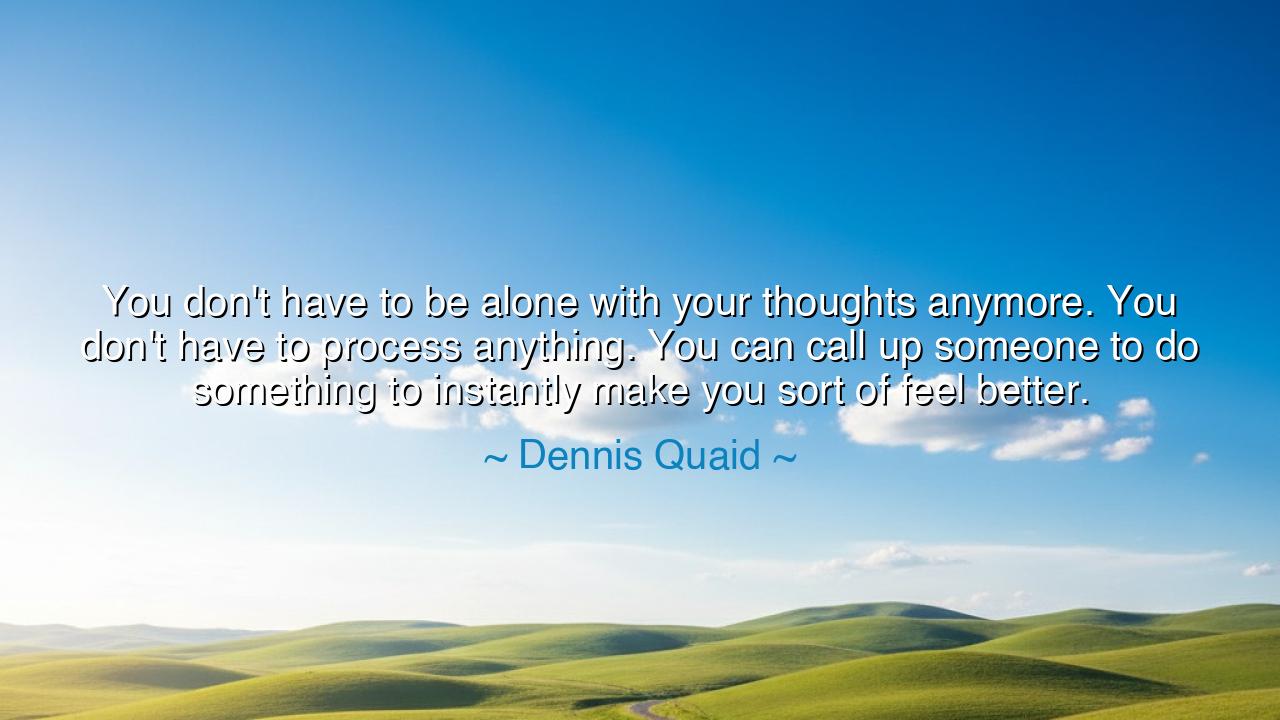
You don't have to be alone with your thoughts anymore. You don't
You don't have to be alone with your thoughts anymore. You don't have to process anything. You can call up someone to do something to instantly make you sort of feel better.






In the reflective words of Dennis Quaid, “You don’t have to be alone with your thoughts anymore. You don’t have to process anything. You can call up someone to do something to instantly make you sort of feel better.” This is not a boast, but a lament — a mirror held to the modern soul. It speaks of an age where distraction has replaced reflection, where the heart flees from silence, and where the mind, unable to bear its own company, seeks constant noise to drown the whispers of truth. Quaid, who has walked through fame, addiction, love, and loss, saw what few dare to name: that our age of connection has become an age of avoidance — and that to lose silence is to lose oneself.
To “be alone with your thoughts” was once the crucible of wisdom. The ancients called it meditation, prayer, contemplation — the sacred act of facing one’s inner wilderness. In the stillness of solitude, kings found humility, and poets found song. Yet today, we have filled every moment with the hum of distraction — screens glowing, voices calling, messages flowing. It is as if we fear the voice within more than the voices without. Quaid’s lament reveals the tragedy of modern man: that he has traded depth for comfort, truth for immediacy, growth for escape.
And so, we have forgotten how to process — how to sit with grief until it ripens into understanding, how to dwell with fear until it teaches courage, how to hold pain until it softens into compassion. Instead, when sorrow comes, we scroll; when anxiety whispers, we call; when loneliness strikes, we fill the silence with anything that will make us “feel better.” But such relief is fleeting. The wound, unexamined, festers. The noise numbs for a time, but the heart remains hungry for meaning.
Consider the example of Siddhartha Gautama, who became the Buddha. He was surrounded by luxury and constant pleasure, yet his spirit was restless. When he left the palace, he did not seek new distractions, but silence. He sat beneath the Bodhi tree and faced every fear, every illusion, every thought that arose within him. For days he did not move, did not flee — and in that profound solitude, enlightenment dawned. His stillness changed the world. Quaid’s words remind us that the same path is still open to us, if only we dare to sit alone and listen.
This truth is echoed in every great journey of the spirit. Jesus withdrew into the wilderness for forty days; Marcus Aurelius, emperor of Rome, wrote his Meditations while camped among soldiers and storms. They all understood what Quaid mourns — that silence is not emptiness, but the forge where the soul is refined. The man who cannot be alone with his thoughts is not yet free. He is bound by the chains of noise, enslaved by the need for escape.
Let this, then, be the teaching: seek silence as you would seek wisdom. Turn off the noise. Walk alone beneath the open sky. Let your thoughts rise like waves, and do not fear their weight. In time, the turbulence will calm, and you will hear beneath it the quiet voice of truth — your own, long forgotten. To “process” is to live; to avoid is to drift. The river that flows through pain becomes clear, but the pond that stagnates in avoidance grows foul.
So, dear listener, remember the wisdom of this age-worn actor who has seen both the blinding lights and the lonely darkness of modern life. Do not fear your thoughts. Do not fear solitude. For in silence, you do not lose yourself — you find yourself. Learn again to sit in stillness, to breathe, to feel, to wait. Let your mind become a mountain unmoved by the winds of distraction. Then, and only then, will you discover that peace is not something you call up from others, but something that rises quietly from within.
Thus, Dennis Quaid’s words echo as both warning and wisdom: in a world that runs from silence, the bravest act is to be still.






AAdministratorAdministrator
Welcome, honored guests. Please leave a comment, we will respond soon